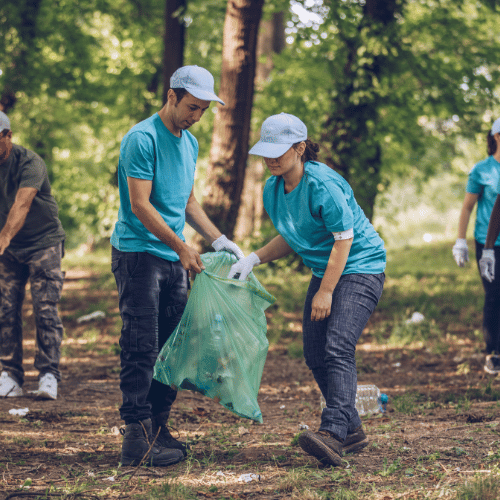- admin
- June 12, 2024
- No Comments
Volunteering & Community Service
Have you ever thought about how volunteering could make your life better? Volunteering in your community isn’t just a way to give back; it’s also a great way to grow as a person. This article talks about how volunteering can help you grow as a person and gives you tips on how to get involved in your community.
The Importance of Volunteering
Volunteering is very important to society. A sense of community is built, social problems are solved, and nonprofits are supported. But the benefits go beyond the effects on society right now.


Personal Growth Through Volunteerism
1. Enhancing Skills and Gaining Experience
By volunteering, you can learn new things and get experience that is useful. These jobs can help your resume and career prospects, whether you’re planning events, managing projects, or working directly with people.
- Skill Development: Learn things like how to lead, talk to people, work as a team, and solve problems.
- Career Advancement: Volunteering in your field of interest can help you learn new things and meet new people.
2. Building Self-Confidence and Self-Esteem
Helping other people and seeing the results of your work can make you feel much better about your own self-worth. You can get out of your comfort zone, try new things, and reach personal goals when you volunteer.
- Confidence Boost: Getting things done and making a difference can make you feel more valuable and capable.
- Personal Satisfaction: Helping a cause can make you feel better about your overall happiness and sense of purpose.
3. Expanding Social Connections
Volunteering puts you in touch with people who share your values and interests. These links can help you make friends that last and build a strong support system.
- Networking Opportunities: Talk to business people and community leaders who can help you and give you chances.
- Social Engagement: Spend more time with other people and feel less alone.
4. Fostering Empathy and Compassion
Volunteering in your community opens your eyes to new ideas and ways of living. This kind of exposure helps people feel empathy, compassion, and a better grasp on problems facing society.
- Empathy Development: Learn to understand other people’s problems and needs so you can act with more compassion.
- Broader Perspective: Learn about other people’s cultures, ways of life, and problems they face.


How to Get Involved in Volunteerism
Giving your time as a volunteer is easier than you think. To begin your journey in community service, here are some useful steps:
1. Identify Your Interests and Skills
Think about the causes you care about and how your skills can help them. Matching your volunteer work with things you’re interested in will make the experience more meaningful and last longer.
- Passion Projects: Pick causes that are important to you, like protecting the environment, helping kids learn, or improving health care
- .Skill Matching: Choose jobs that let you use the skills you already have or give you chances to learn new ones.
2. Research Volunteer Opportunities
Look for ways to volunteer in your area or on the Internet. A lot of groups are always looking for volunteers to fill a wide range of roles.
- Local Organizations: Check with schools, community centers, and nonprofits to see if they need volunteers.
- Online Platforms: To find jobs, use websites like Idealist, HandsOn Network, and VolunteerMatch.
3. Commit Your Time and Energy
Figure out how much time you can really give to volunteering. Being consistent is important, so pick a level of commitment that works for you.
- Time Management: Make sure you have time for both your volunteer work and your personal and professional obligations.
- Regular Commitment: Make a schedule to make sure you can always contribute.
4. Attend Volunteer Orientation and Training
A lot of groups offer training and orientation sessions for new volunteers. You can learn a lot about the organization, its mission, and your role at these sessions.
- Orientation Sessions: You will learn about the organization’s policies, procedures, and goals.
- Skill Training: Get training that is specific to your volunteer job to make sure you can do it well.
5. Engage and Reflect
Spend as much time as possible volunteering and think about how your work has helped others. Continuous involvement and self-reflection make the personal growth that comes from volunteering even better.
- Active Participation: Means taking part in things, asking questions, and being responsible.
- Reflective Practice: Think about your experiences on a regular basis to see how you’ve changed and where you can improve.
Examples of Volunteer Opportunities
To start, think about these common ways to volunteer:
- Local Food Banks: Sort food and give it to people who need it.
- Animal Shelters: Help animal shelters with care for animals and events where pets can be adopted.
- Tutoring Programs: Help students with their schoolwork.
- Environmental Cleanups: To encourage sustainability, take part in community clean-up projects.
- Hospitals and Care Centers: Give patients and residents of hospitals and care centers company and support.
Conclusion
Volunteering is a great way to improve yourself and your community. Doing community service can help you learn useful skills, boost your confidence, meet new people, and develop empathy. Find out what you’re interested in, look into opportunities, and then commit your time and energy. You can have a big effect on your life and on the people around you by volunteering.







